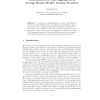Free Online Productivity Tools
i2Speak
i2Symbol
i2OCR
iTex2Img
iWeb2Print
iWeb2Shot
i2Type
iPdf2Split
iPdf2Merge
i2Bopomofo
i2Arabic
i2Style
i2Image
i2PDF
iLatex2Rtf
Sci2ools
116
click to vote
ALT
2007
Springer
2007
Springer
Pseudometrics for State Aggregation in Average Reward Markov Decision Processes
We consider how state similarity in average reward Markov decision processes (MDPs) may be described by pseudometrics. Introducing the notion of adequate pseudometrics which are well adapted to the structure of the MDP, we show how these may be used for state aggregation. Upper bounds on the loss that may be caused by working on the aggregated instead of the original MDP are given and compared to the bounds that have been achieved for discounted reward MDPs.
Related Content
| Added | 14 Mar 2010 |
| Updated | 14 Mar 2010 |
| Type | Conference |
| Year | 2007 |
| Where | ALT |
| Authors | Ronald Ortner |
Comments (0)

